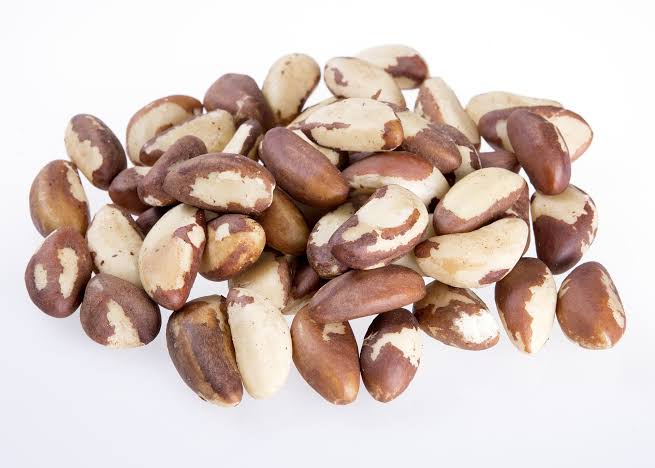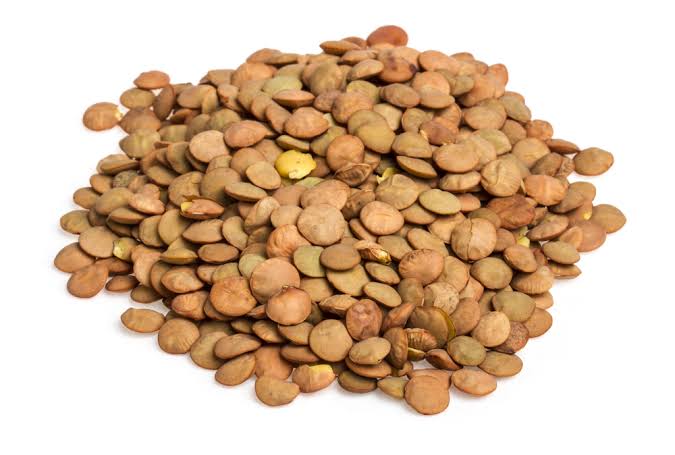The Bertholletia excelsa, or Brazil nut, tree is native to South America. They’re high in omega-3 fatty acids, protein, fibre, and selenium.
The Brazil nut, despite its name, is actually a seed rather than a nut. Nuts are hard-shelled fruits with a single large seed, according to description. Pistachios and walnuts are two examples.
Brazil nuts can provide unexpected and powerful nutritional benefits, such as improved heart health, antioxidants, and brain function.
We’ll go through the health benefits of Brazil nuts, as well as the risks and how to incorporate them into your diet, in this article.
Antioxidant properties

Brazil nuts contain selenium, which can help the body’s antioxidant system and prevent oxidative stress.
The liver converts selenium into selenoprotein P, a form of protein that effectively eliminates excess free radicals. Oxidative stress is caused by free radicals, and research has related them to a variety of chronic health problems, including cancer.
The antioxidant effects of Brazil nuts were investigated by a placebo-controlled, double-blind study. For 12 weeks, 91 people with hypertension and elevated blood cholesterol levels were given either 13 g of granulated, partially defatted Brazil nuts or a placebo.
Selenium levels were higher in the Brazil nut group, as was the activity of an antioxidant enzyme called GPx3. They also had lower levels of oxidised low-density lipoprotein (LDL), or “bad cholesterol,” as it is often referred to.
Anti-inflammation properties
Brazil nuts’ antioxidant properties can aid in the reduction of inflammation in the body. Many chronic health problems are linked to inflammation.
The health effects of consuming one Brazil nut a day in people with chronic kidney disease were investigated in a small-scale 2014 study. After three months, the researchers found a decrease in inflammation and oxidative stress markers.
Blood sugar control
Selenium-rich foods can help people with their blood sugar levels.
In a study published in the European Journal of Nutrition, healthy adults who ate one Brazil nut per day for eight weeks had lower total cholesterol and fasting glucose levels.
Another 8-week research found that people with type 2 diabetes and coronary heart disease who took a 200-mcg selenium supplement had lower insulin levels and increased insulin sensitivity. The researchers also discovered that the body’s antioxidant potential had increased.
Improving brain performance
Antioxidants are beneficial to the brain’s health. Brazil nuts are high in antioxidants, which can help to improve brain function.
Reduced antioxidant activity has been related to cognitive dysfunction and neurodegenerative disorders, such as Alzheimer’s disease, by scientists.
According to the results of a 2014 study, people with Alzheimer’s disease have lower selenium levels than those who do not have the disease.
According to a small-scale experiment, eating one Brazil nut a day for six months improved certain cognitive functions in older adults with mild cognitive impairment (MCI) as compared to a control group. This may be attributed to the nuts’ ability to reverse selenium deficiency.
There was no connection between selenium levels and cognitive capacity, according to according to a recent report. More research is needed to learn how selenium affects cognition and whether it can help prevent or cure neurodegenerative diseases.
Nutrition

Selenium, an important mineral with antioxidant properties, is abundant in Brazil nuts, making them one of the best dietary sources. Selenium is important for reproduction, metabolism, and immune function.
A single Brazil nut contains 68 to 91 micrograms (mcg) of selenium, which means that one nut per day will provide the daily recommended adult allowance of 55 mcg of selenium.
Brazil nuts are high in protein, basic minerals, and healthy fats, in addition to selenium.
A serving of three Brazil nuts includes the following nutrients, according to the United States Department of Agriculture (USDA):
- 99 calories
- 2.15 grams (g) of protein
- 10.06 g of fat
- 1.76 g of carbohydrate
- 1.10 g of fiber
- 109 milligrams (mg) of phosphorus
- 99 mg of potassium
- 56 mg of magnesium
- 24 mg of calcium
- 0.61 mg of zinc
- 0.36 g of iron
- 0 mg of sodium
It’s no surprise that Brazil nuts have become so common, given their impressive nutritional profile.
Cardiovascular health
Polyunsaturated and monounsaturated fatty acids, found in Brazil nuts, are good for you.
Eating monounsaturated and polyunsaturated fats instead of saturated and trans fats, according to the American Heart Association (AHA), helps reduce cholesterol levels, which reduces the risk of heart disease and stroke.
Brazil nuts also provide dietary fibre. According to the American Heart Association, consuming fiber-rich foods reduces the risk of heart disease, stroke, obesity, and type 2 diabetes.
According to the results of a 2019 review, people with diabetes who ate more tree nuts have a lower risk of cardiovascular disease and heart attack.
Thyroid health
Selenium deficiency can result in hormonal imbalances, affecting sleep, mood, concentration, and metabolism.
Selenium is needed for the development of hormones. The thyroid gland converts thyroxine hormone (T4) into its active form, triiodothyronine hormone, with the aid of selenium (T3).
Getting enough selenium from your diet will help you avoid or manage thyroid issues like hypothyroidism.
Best way to eat Brazil nuts
Brazil nuts may be eaten whole or added to other foods as a snack. Brazil nuts can be consumed raw or roasted.
To cook Brazil nuts on the stovetop:
- Place a layer of Brazil nuts in a skillet over medium heat.
- Stir the nuts every minute or so to avoid burning them.
- Continue cooking for about 5 to 10 minutes until the nuts become aromatic.
To roast Brazil nuts in the oven:
- Preheat the oven to 350°F.
- Place the nuts on a layer of parchment paper on a baking sheet.
- Place the baking sheet in the preheated oven and roast for 5 minutes.
- Remove the baking sheet and stir the nuts.
- Return the baking sheet to the oven for another 5 minutes.
- Remove the nuts from the oven and season them with salt, herbs, or spices.
- Allow the nuts to cool completely before eating them.
Brazil nuts can be used in pad Thai dishes, trail mixes, and pesto. Chopped Brazil nuts can also be used as a healthy topping for oatmeal, salads, and even brownies.
Brazil nuts can be found in most supermarkets, or people can shop for them online.
Is it possible to eat too many Brazil nuts?
More isn’t always better when it comes to Brazil nuts. To prevent harmful side effects, people should limit their consumption of Brazil nuts to a few per day. Brazil nuts are high in calories and can cause selenium toxicity if consumed in excess.
Brazil nuts, like most nuts, are high in calories. People who consume an excessive amount of Brazil nuts run the risk of exceeding their daily calorie allowance. Excessive calorie consumption can lead to unwanted weight gain.
Brazil nuts are a form of tree nut that can cause allergic reactions in some people. According to the American College of Allergy, Asthma & Immunology, 25 to 40% of people with a peanut allergy often have a reaction to at least one kind of tree nut.
Selenium toxicity
Brazil nuts’ high selenium content is responsible for many of their health benefits. Brazil nuts, although beneficial in small amounts, can cause selenium toxicity if consumed in large quantities on a regular basis.
Selenium toxicity, according to the National Institutes of Health (NIH)Trusted Source, can cause a range of symptoms, including:
- dizziness
- gastrointestinal problems
- hair loss
- brittle nails
- skin rashes or lesions
- nervous system problems
- fatigue
- irritability
- muscle tenderness or soreness
- joint pain
It can sometimes also cause severe symptoms, which may include:
- acute respiratory distress syndrome
- heart attack
- kidney failure
- heart failure
Selenium toxicity can be fatal in exceptional circumstances.
Since the amount of selenium in Brazil nuts varies depending on the amount in the soil, each nut can have a different amount.
Conclusion
Brazil nuts have a lot of health benefits, but they should be consumed in moderation.
Certain compounds in Brazil nuts, according to scientific studies, can benefit health in a variety of ways, including lowering the risk of heart disease, controlling blood sugar levels, and boosting the body’s antioxidant system.
Natural selenium, an important mineral known for its antioxidant properties, is abundant in Brazil nuts. While selenium is beneficial to health, too much of it can cause selenium toxicity.
Sources
- Basic report: 12078, nuts, brazilnuts, dried, unblanched. (2018).
https://ndb.nal.usda.gov/ndb/foods/show/12078 - Cardoso, B. R., et al. (2014). Selenium status in elderly: Relation to cognitive decline [Abstract].
https://www.sciencedirect.com/science/article/pii/S0946672X14001631?via%3Dihub - Cardoso, B. R., et al. (2018). Selenium status is not associated with cognitive performance: A cross-sectional study in 154 older Australian adults.
https://www.ncbi.nlm.nih.gov/pmc/articles/PMC6315874/ - Donadio, J. L. S., et al. (2018). SEPP1 polymorphisms modulate serum glucose and lipid response to Brazil nut supplementation [Abstract].
https://link.springer.com/article/10.1007%2Fs00394-017-1470-7 - Farrokhian, A., et al. (2016). Selenium supplementation affects insulin resistance and serum hs-CRP in patients with type 2 diabetes and coronary heart disease [Abstract].
https://www.thieme-connect.com/products/ejournals/abstract/10.1055/s-0035-1569276 - Full report (all nutrients): 12078, nuts, brazil nuts, dried, unblanched. (2018).
https://ndb.nal.usda.gov/ndb/foods/show/12078? - Huguenin, G. V. B., et al. (2015). Improvement of antioxidant status after Brazil nut intake in hypertensive and dyslipidemic subjects.
https://www.ncbi.nlm.nih.gov/pmc/articles/PMC4477321/ - Liu, G., et al. (2019). Nut consumption in relation to cardiovascular disease incidence and mortality among patients with diabetes mellitus.
https://www.ahajournals.org/doi/full/10.1161/CIRCRESAHA.118.314316?url_ver=Z39.88-2003&rfr_id=ori%3Arid%3Acrossref.org&rfr_dat=cr_pub%3Dpubmed& - Monounsaturated fat. (2015).
https://www.heart.org/en/healthy-living/healthy-eating/eat-smart/fats/monounsaturated-fats - Polyunsaturated fat. (2015).
https://www.heart.org/en/healthy-living/healthy-eating/eat-smart/fats/polyunsaturated-fats - Rita Cardoso, B., et al. (2016). Effects of Brazil nut consumption on selenium status and cognitive performance in older adults with mild cognitive impairment: A randomized controlled pilot trial [Abstract].
https://www.ncbi.nlm.nih.gov/pubmed/25567069 - Selenium: Fact sheet for health professionals. (2018).
https://ods.od.nih.gov/factsheets/Selenium-HealthProfessional/ - Stockler-Pinto, M. B., et al. (2014). Brazil nut (Bertholletia excelsa, H.B.K.) improves oxidative stress and inflammation biomarkers in hemodialysis patients.
https://www.researchgate.net/profile/Milena_Stockler-Pinto/publication/260121286_Brazil_Nut_Bertholletia_excelsa_HBK_Improves_Oxidative_Stress_and_Inflammation_Biomarkers_in_Hemodialysis_Patients/links/00b49530223dd2a956000000.pdf - Tree nut allergy. (n.d.).
https://acaai.org/allergies/types/food-allergies/types-food-allergy/tree-nut-allergy - Whole grains, refined grains, and dietary fiber. (2016).
https://www.heart.org/en/healthy-living/healthy-eating/eat-smart/nutrition-basics/whole-grains-refined-grains-and-dietary-fiber






